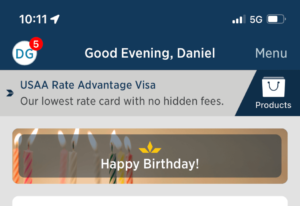
Do you know when your customers’ birthdays are? If so, you should definitely wish them a happy birthday.
I recently celebrated a birthday, so like any customer experience guy worth his salt, I decided to conduct an experiment.
I speak and write often about doing the simple things better in customer experience. One example of this is actually using the customer data that you have taken the time to collect.
Think about all of the times you have shared your birthday with a company or government entity:
Now think about all of the times that companies have remembered to wish you a happy birthday. It’s hard to think of many, right?
So for my recent birthday, I decided to open up every app on my phone that I knew had my birthday on file to see which ones took notice. These included:
Out of 21 apps, exactly 3½ recognized my birthday (I’ll explain the half in a moment).
None of the airlines or payment apps said anything, and only one bank, one hotel, and one social media platform paid any attention to my special day. Can you guess which ones?
Kudos to Marriott for being the only travel company to wish their customers a happy birthday — complete with flying confetti.

USAA was subtle but effective at the top of the app’s home screen, with a “happy birthday” banner and candles in the background.

And Twitter displayed animated balloons on my profile page. I was especially surprised that no other social media channels recognized the occasion.

So which company got the half-point? Well, it turns out that Snapchat offers a birthday filter within a certain number of days of your birthday, but like with most things in the Snapchat UX, it wasn’t intuitive and my kids had to show me where it was.
The lesson here is simple: Recognizing your customers’ birthdays or other important life or career milestones is a simple, inexpensive, and personalized way to show them that you’re paying attention and that you care. It improves the customer experience and engenders loyalty with almost no cost.
After all, if you’re not going to use the customer data you collect, why collect it in the first place?
Main image by Jeevan Singla from Pixabay